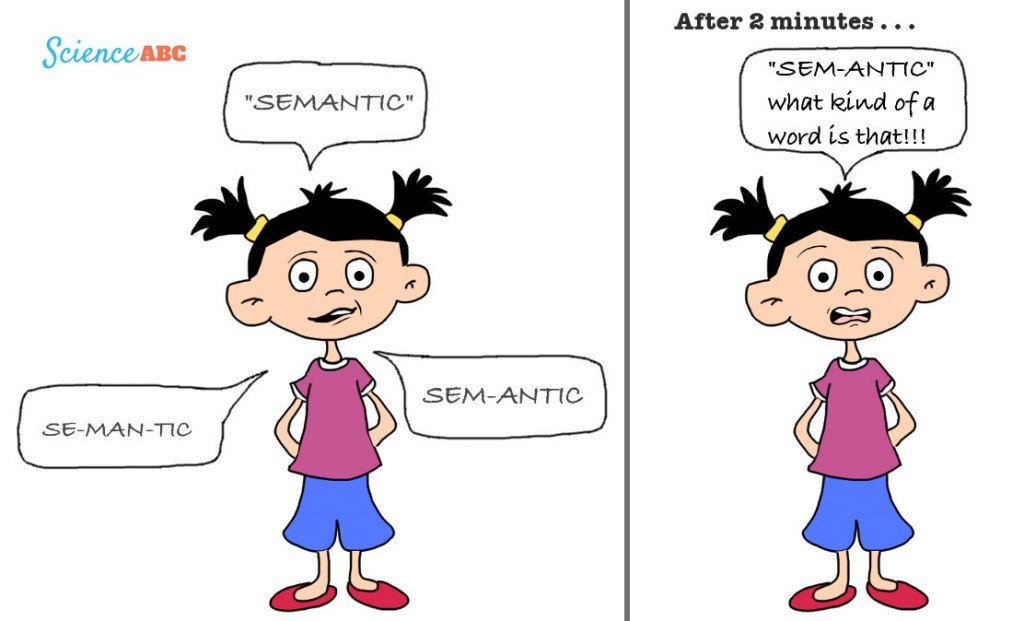Says a Word Really Fast Over and Over Again
Semantic Satiation: Why Does A Word Sound Weird When Repeated Multiple Times?
Updated on: 17 Jan 2022 past Ashish
"'Wording'. What a bully word that is, right? 'Diction'. I call up the word is so slick that I like to say it over and over once again.
This guy has dandy diction.
You should really work on your diction.
Diction is all almost choosing the right words in the right places.
Diction. Hmm.. diction… d-i-c-t-i-o-due north… diction… di– wait a minute, why does the word audio so weird now?"
Does this state of affairs audio familiar? Has it always happened to you that a perfectly normal word, when repeated over and over and over again, suddenly loses all its significant and starts sounding weird? This includes both prolonged viewing of the discussion and its active repetition (oral or written).
If this has happened with you, and so let me tell you this:

This phenomenon (namely when a word loses all its meaning when repeated multiple times), in fact, is quite common, and it also has a fancy name: semantic satiation.
Recommended Video for you:
What is semantic satiation?
Semantic satiation is the proper noun of a psychological phenomenon wherein the repetition of a discussion, whether information technology's visual or oral, causes it to lose its meaning for the viewer/listener, and makes it seem similar it'south merely a meaningless sound. Historically, the term 'semantic satiation' has been used to refer to the subjective loss of pregnant that comes as a result of prolonged exposure to a word.

The term 'semantic satiation' was coined past Leon Jakobovits James (a psychology professor at the Academy of Hawaii) in his 1962 doctoral dissertation at McGill Academy; he wrote his doctoral thesis on the phenomenon. According to James, information technology's a kind of fatigue (reactive inhibition). He says, "when a encephalon jail cell fires, information technology takes more free energy to fire the second fourth dimension, and notwithstanding more the tertiary time, and finally the quaternary time, it won't even respond unless you await a few seconds." He adds that the more times you repeat a word, the more energy it takes.
Although, y'all can experience semantic satiation with practically every word, some words lose pregnant faster than others. These are commonly the words with whom you have "stronger associations". For instance, the word "Internet" would turn into brain mush far less quickly than the word "semantic".

Semantic satiation can be experienced with any word.
But why does really happen? What's going on hither?
Reason behind semantic satiation
When yous hear, read or speak a word, your brain isn't really listening to its audio; rather, information technology's translating those sounds into an idea. That idea is then put together with other words, to form a more than circuitous thought. Nonetheless, when yous echo a word multiple times, your brain ceases to recognize information technology as a give-and-take (which subsequently keeps it from translating it into an idea), and breaks it downward into sounds. These sounds, of course, have zip to do with the inherent meaning of the word. That's why a purely normal give-and-take begins to sound similar gibberish.

The longer a word is 'played' with, the more than meaningless it becomes.
Recollect of information technology this way: our brains have an incredible ability to take words and sympathise an entire concept associated with them. For instance, when y'all think of the give-and-take "book", you instantly conjure up the paradigm of a book. You may have additional details like color, thickness, cover etc. in the groundwork, but you instantly connect with the idea of a book the moment you look at the word or hear/speak information technology.
However, when you lot start repeating it actively, the brain refocuses on the actual word "volume". Then, information technology thinks well-nigh the discussion, its intonation, sound, the messages it comprises etc. These things patently have nothing to do with the idea of a volume, which is why the give-and-take seems meaningless the more times it'due south repeated.
Interestingly, the idea of semantic satiation is used to develop techniques to reduce speech anxiety past stutterers. The repetition of specific words leads to semantic satiation, which, in plow, leads to a reduction in the intensity of negative memories and emotions that are triggered while speaking.
Did you ever imagine that something you considered a random 'thing' with words could actually exist used to help patients with speech defects?
I doubt it. Doubt it. Incertitude… doubt… d-o-u-b-t…
Suggested Reading
-
Language Files: Materials for an Introduction to Language and Linguistics, twelfth Edition -
In the Margins. On the Pleasures of Reading and Writing -
Phonology: Theory and Description (Introducing Linguistics, Vol. 1)
Aid us make this commodity ameliorate
Follow ScienceABC on Social Media:
Well-nigh the Author
Ashish is a Science graduate (Bachelor of Science) from Punjabi University (Bharat). He spearheads the content and editorial fly of ScienceABC and manages its official Youtube aqueduct. He'southward a Harry Potter fan and tries, in vain, to use spells and charms (Accio! [insert object name]) in real life to get things done. He totally gets why JRR Tolkien would create, from scratch, a language spoken past elves, and tries to bring the same passion in everything he does. A big admirer of Richard Feynman and Nikola Tesla, he obsesses over how thoroughly scientific discipline dictates every aspect of life… in this universe, at least.
.
Science ABC YouTube Videos
-
 Particle accelerators: What are they, how do they work and why are they important to us?
Particle accelerators: What are they, how do they work and why are they important to us? -
 How Do Neurons Work?
How Do Neurons Work? -
 How Scientifically Accurate Is The HBO Miniseries Chernobyl?
How Scientifically Accurate Is The HBO Miniseries Chernobyl? -
 Cellular Respiration: How Do Cell Get Energy?
Cellular Respiration: How Do Cell Get Energy? -
 Multiverse Theory Explained: Does the Multiverse Really Exist? Truth of Multiple Realities
Multiverse Theory Explained: Does the Multiverse Really Exist? Truth of Multiple Realities -
 What Exactly is Spacetime? Explained in Ridiculously Elementary Words
What Exactly is Spacetime? Explained in Ridiculously Elementary Words -
 What Are The Dissimilar Atomic Models? Dalton, Rutherford, Bohr and Heisenberg Models Explained
What Are The Dissimilar Atomic Models? Dalton, Rutherford, Bohr and Heisenberg Models Explained -
 Why Is Blood Drawn From Veins And Not From Arteries?
Why Is Blood Drawn From Veins And Not From Arteries?
schoolerhoustent44.blogspot.com
Source: https://www.scienceabc.com/eyeopeners/semantic-satiation-why-does-a-word-sound-weird-when-repeated-multiple-times.html



0 Response to "Says a Word Really Fast Over and Over Again"
Enregistrer un commentaire